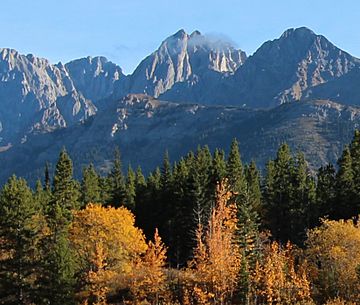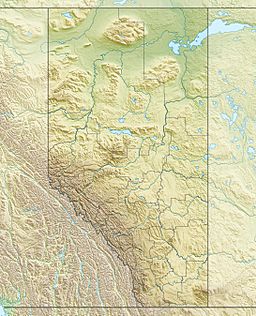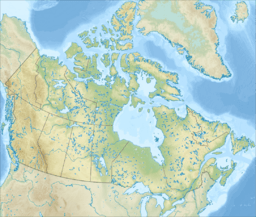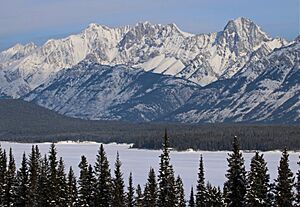Mount Packenham facts for kids
Quick facts for kids Mount Packenham |
|
|---|---|

Mount Packenham (centered), west face showing
|
|
| Highest point | |
| Elevation | 3,000 m (9,800 ft) |
| Prominence | 242 m (794 ft) |
| Parent peak | Mount Evan-Thomas (3098 m) |
| Geography | |
| Location | Alberta, Canada |
| Parent range | Opal Range Canadian Rockies |
| Topo map | NTS 82J/14 |
| Geology | |
| Age of rock | Cambrian |
| Type of rock | Limestone |
| Climbing | |
| First ascent | 1954 by N. Gish, M. Dickson, P. Rainier, S.G. Pearson |
| Easiest route | Mountaineering YDS 5.6 |
Mount Packenham is a 3,000-metre (9,800-foot) mountain in the Canadian Rockies of Alberta, Canada. It is part of the Opal Range. The mountain is close to Mount Evan-Thomas, which is about 1.0 km (0.62 mi) to the north and a bit taller.
You can see Mount Packenham from Highway 40 and the Kananaskis Lakes area. It sits on the edge of Peter Lougheed Provincial Park. Many mountains in Kananaskis Country are named after people and ships from the 1916 Battle of Jutland. This was a major sea battle during World War I.
Contents
Mountain's History and Naming
Mount Packenham was named after William C. Pakenham (1861-1933). He was a Rear Admiral in the Royal Navy. This means he was a very high-ranking officer in the navy. He led the 2nd Battlecruiser Squadron during the Battle of Jutland in World War I.
The name became official in 1922. However, the Geographical Names Board of Canada made a small mistake. They misspelled Pakenham's name, which is why it's "Packenham" instead of "Pakenham."
First Climbs of Mount Packenham
The first group to climb Mount Packenham was in 1954. This team included N. Gish, Malcolm Dickson, P. Rainier, and S.G. Pearson.
Some people think this group might have actually climbed Mount Evan-Thomas by mistake. If that's true, then the first successful climb of Mount Packenham happened in 1972. That climb was made by J. Pomeroy, M. Simpson, D. Forrest, and G. Boles.
What Mount Packenham is Made Of
Mount Packenham is made of sedimentary rock. This type of rock forms from layers of sand, mud, and tiny bits of sea creatures that settle over millions of years. These layers were laid down a very long time ago, from the Precambrian to the Jurassic periods.
Over time, these rock layers were pushed up and folded. This happened during a big mountain-building event called the Laramide orogeny. Mount Packenham was formed when a huge block of rock slid over younger rock, an event known as the Lewis Overthrust. The rocks in the Opal Range are tilted steeply, with softer layers found between harder ones.
Weather and Climate Around the Mountain
Mount Packenham is in a subarctic climate zone. This means it has cold, snowy winters and mild summers. Temperatures can drop very low, sometimes below −20 °C. With the wind, it can feel even colder, below −30 °C.
If you want to climb Mount Packenham, the best time to visit is usually from June through September. The weather is generally more pleasant during these months.
Water from the mountain flows into different rivers. Water from the west side goes into the Kananaskis River. Water from the east side flows into smaller streams that join the Elbow River. Both the Kananaskis and Elbow rivers eventually flow into the Bow River, and then into the Saskatchewan River.
 | William Lucy |
 | Charles Hayes |
 | Cleveland Robinson |




